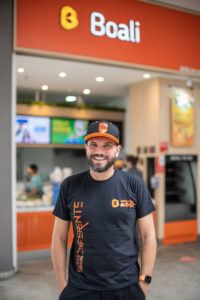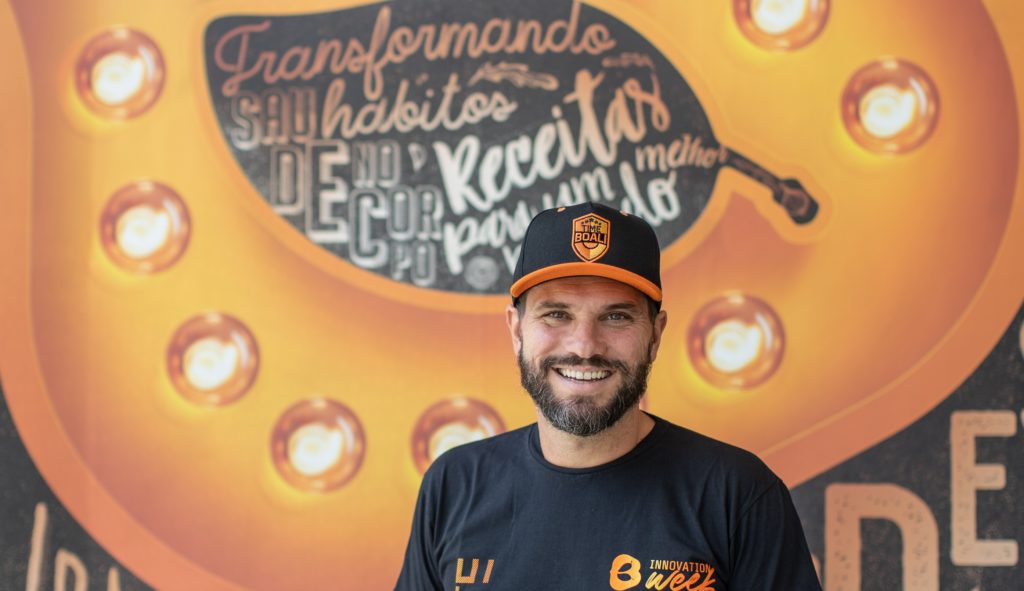São Paulo – Intending to globalize access to healthy food and transform habits, Rodrigo Barros (pictured above), alongside partners Fernando Bueno and Victor Giansante, founded Boali between late 2015 and early 2016. Barros, the company’s current CEO, told ANBA about international expansion plans to be deployed this year.
In 2023, the entirely Brazilian company expects to arrive in three more countries. Adapting to regional aspects in terms of products and respecting the local culture but maintaining the essence of the business, Boali wants to open three to four franchises in the states of Florida, Colorado, and Wisconsin, in the USA; one in Dubai, UAE; and another in the Lisbon region, in Portugal.

The idea of exporting the business came for two reasons: First, according to the CEO, the company had already reached the necessary maturity for this endeavor, and second, Boali came close to the expected growth for 2022. “We always aimed at having 100 operations in Brazil, a number we will reach by the first half of this year, to conquer the world,” said Barros.
Currently, the brand is in 17 Brazilian states, with 29 franchisees in over 80 operations. The average ticket nationwide is BRL 40 (about USD 7.70 at the current rate). Despite being quite diverse, the public is composed chiefly of economically active women who enjoy healthy food between ages 35 and 45.
Brand expansion to other countries
Portugal is the country where the negotiations are closest to materializing. By April, Boali expects to open its first franchise in the Lisbon region. Next, the same group taking the brand to Portugal wants to expand its business to Spain.
“With the USA, we are discussing and negotiating. We want to serve three states, with at least one franchise in each region. The idea is to have the first franchise by the first half of 2023,” said the CEO.
As there is already a more consolidated healthy food market in the USA, the founders intend to take what they have on the menu and change the point of sale’s layout, as the US public is more used to picking up meals to eat at the office, on the street, walking, or at home.
Concerning Arab countries, earlier on, the intent was to start expansion only in Dubai, and there was already a projection to open the first store in the emirate; however, Barros saw Boali’s opportunities could go much further.
“These countries have significant purchasing power, with excellent consumption potential, and the West still pays little attention. We see a lot of the cosmopolitan evolution Dubai had, but it is minimal compared to all the opportunities in Arab countries due to globalization and cultural development. That’s where most regional brands are, but there are great opportunities for new global brands to enter. We have been very well welcomed by everyone we talked to.”
With negotiations underway with different groups, the plan now is to have 55 operations in five years. Of this total, 20 operations could be placed in Saudi Arabia alone, and the rest between Qatar, the UAE, Bahrain, Kuwait, and Oman.
The opening of the first point of sale, in line with this new plan, is expected to still be in Dubai, but there is no set date. However, plans may change as negotiations are ongoing.
Brand establishment
The idea of creating the first, and today biggest, healthy food franchise in the country came from the continuation of another brand: Salad Creations. Among the four young people who brought the North American salad company to Brazil in 2007 were Fernando Bueno and Victor Giansante. Barros joined as an investor in 2013 and said in the early 2000s, healthy foods started to be a growing trend in the United States, but when the company came to Brazil, it was still an impractical option.
With that in mind, in 2015, Salad Creations’ operations in Brazil were bought by the trio, who transformed it into Boali, short for ‘Good Nutrition’ in Portuguese. “When we created Boali, one of the first things we understood was we couldn’t have a salad-only business. So we created a business beyond salads, a good food business, healthy food, but at the same time, affectionate food, which could make sense for the Brazilian’s daily life,” explained the CEO.
Therefore, in addition to salads, in 2016, the first Boali restaurant, at Ribeirão Shopping, in the city of Ribeirão Preto, in the interior of São Paulo state, presented other food options such as crepes, wraps, burritos, bowls, and desserts – with 70% cocoa, beverages such as teas, natural juices, and kombuchas.
Even with a business in full expansion, Barros said healthy food is still not very popular among Brazilians, mainly due to a lack of access, scale production, and price. “What we have been doing is precisely giving this access, making it possible for people to pay for Boali the same as they pay at other food court restaurants, where they usually spend around BRL 40 (about USD 7.7) for a meal and drink,” he said.
The level of awareness of Brazilians towards healthy food has increased, with the public more concerned about better nutrition. However, processed food is still consumed more because it is cheaper. The low price is only feasible by large-scale production.
For Barros, issues such as infrastructure, food education, food safety, and food security need to gain more prominence so healthy food will get attention, increase the number of consumers, and thus start to be produced on a larger scale.
With a business model focused on kiosks or points of sale in shopping malls, in addition to street stores and in-office stores, within companies, the brand reached 17 Brazilian states. Boali’s headquarters, located in the Alphaville neighborhood, in Barueri, in the São Paulo city metropolis, has over 500 employees. In 2029, the CEO’s idea is to make an IPO to universalize access to healthy food further.
Translated by Elúsio Brasileiro




